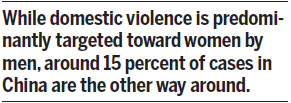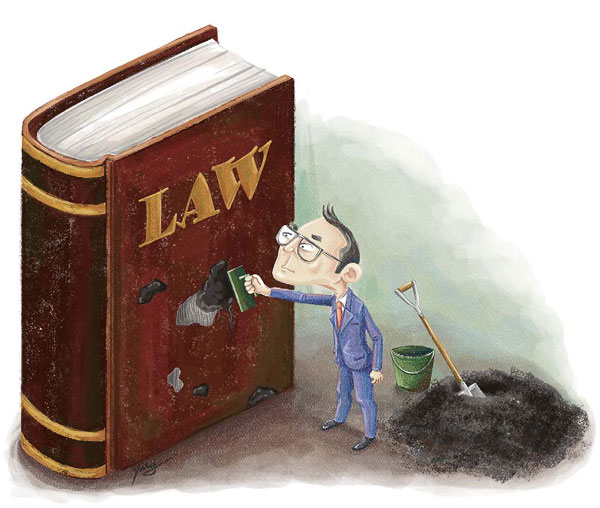It's time rape laws cover male victims
Updated: 2014-10-31 14:12
(China Daily Europe)
|
|||||||||||
The notion that men could be victimized by sexual assault is foreign to many in China, but sporadic reporting of such cases proves the legal codes must be amended
In the wee hours of March 18, 2009, three young men, who were drunk, found themselves outside a local hospital in Shijiazhuang, Hebei province. Chen Cong and Xu Jian spotted Li Ming dozing off by a pond after he had been binge drinking with his buddies.
After the two woke him, a squabble ensued. The two ended up beating Li and mugging him of 19 yuan, which is all he had on him. Almost as an afterthought, they took turns raping him.
Fortunately, a taxi driver witnessed the incident, which took place outdoors and lasted half an hour, and alerted the police.
The police, however, said they had never seen anything like this before and were divided: one group insisted the violent act was rape while the other argued it did not fit the legal description of rape.
Eventually, prosecutors said they would charge Chen and Xu with physical assault and mugging, but not rape. The reason? They said China's Criminal Law only specifies that a female could be the victim of a sexual assault.
Consequently, a suspect who allegedly sexually assaults a man is often prosecuted for other crimes. Assault and battery is probably the most common charge because they tend to occur with raping. This, in turn, gives rise to the gallows humor that, if the victim does not struggle during the process and consequently is not injured, there are no grounds for prosecution.
If the victim is under 14, gender does not matter because he is legally a minor and the case would be prosecuted as a sexual assault on a minor.

However, many cases involve two adult males, such as a 2010 incident in Shenzhen, Guangdong province, where a male security guard "forcibly had sex with his roommate". The two had to settle out of court after the police told them the Criminal Law could not be applied to their case. That same year, another security guard in Beijing raped an 18-year-old colleague. He was sentenced to a year in prison for assault and battery.
Admittedly, many of the perpetrators in these stories are homosexual. But not all of them. The two suspects in the Shijiazhuang case said they were not gay, just drunk and sexually deprived. But these cases, when they come to light, invariably cause a backlash against gays. Some in the public, frustrated with the inadequacies of the law, equate sexual predation of this kind with homosexuality in general.
This gaping hole in the legal codes is especially glaring when it comes to cases involving adolescents. When sexual predators are teachers and their victims are teenage boys - boys above 14 but not yet 18 - there is no law to bring the attackers to justice or place the teenagers under legal protection.
But things will soon change.
The latest draft amendment of the Criminal Law, which the National People's Congress Standing Committee will soon review, has removed the gender specificity from the description of victims of sexual assault. Instead of "women", it has now become the gender-vague "others".
This will cover most of the male-on-male sexual assault and rape cases that have surfaced in the past decade. No longer will bruises from battery be necessary as evidence to convict a perpetrator of sexual assault.

As a matter of fact, the gender of either the perpetrator or the victim would be irrelevant. Granted, female-on-male sexual assaults are extremely rare, but if we broaden it to sexual harassment it is entirely possible. And if we take away the word "sexual", we'll know that exceptions exist relative to the rules.
While domestic violence is predominantly targeted toward women by men, around 15 percent of cases in China are the other way around. This is according to a report by a women's association, who said it surprisingly finds men occasionally showing up at its door for help. Most men would not swallow the pride to turn to professional guidance. (The same report indicates that 30 percent of Chinese households suffer from domestic violence.)
I first wrote about men as victims of domestic violence a dozen years ago and some readers protested that I was overstating the truth to cover up the extent of male-on-female violence. But I was merely reporting what the women's association discovered. I was not shocked by their revelation because I had empirical evidence to that effect. I had seen quite a few families in which the wives tortured the husbands in more ways than psychological.
Of course it may be difficult to draw a line between domestic violence and some forms of "fooling around" that involve violence. A survey on qq.com, one of China's most popular portal sites, reveals that one-fifth of men said they had been slapped in the face by their girlfriends and 40 percent of the female respondents said they had done so to their boyfriends.
Since this is an online poll and not necessarily statistically sound, I'd rather trust the figure from the women's association. I believe that the exceptions actually help prove the norm. Just because most cases of sexual assault, violence and harassment are men on women, people tend to brush it aside and laugh it off as improbable when it is men-on-men or women-on-men. The previous reluctance to amend the law may also be rooted in the conviction that including men in the category of victims would somehow trivialize the grievances of women in such situations.
Sexual aggression occurs with someone in power and another in relative disadvantage. When a much bigger person bullies a smaller one sexually, it is a manifestation of physical power. More frequently, it is a less tangible form of power, such as when a teacher harasses and assaults a teenage student. The student - whether the victim is a male or female - feels the pressure to comply because the adult has the power to give bad grades or mete out other penalties. The same applies to dynamics between a superior and a subordinate in any organization.
If the person who sexually pesters is in a position of less power relative to the one being pestered (e.g. a fan and a celebrity), it will stay at the stage of stalking unless the former takes physical action and attacks the latter. When a self-delusional fan made every attempt to approach superstar Andy Lau with the intention of marrying him, Lau was clearly the victim, but it did not develop to the phase of sexual assault. The female fan did not get that chance.
Sometimes I ponder the complications when different dynamics are thrown into the same equation. Say, when an 18-year-old male student, who is big and strong and known for sexual aggressiveness, and a 24-year-old woman teacher, who is small in stature, accuse each other of sexual assault. Who is more likely the victim?
Let's throw in other parameters like looks and circumstances. Or maybe we can reverse the genders and see whether the same reasoning would hold. What if one side was manipulating public perceptions and the law by making the other look like the perpetrator?
Again, I repeat I'm not discounting the seriousness of sexual assaults on women and minors. But the world offers myriad possibilities and revising the Chinese Criminal Law to protect men from sexual assault is a small step toward equality for all.
The writer is editor-at-large of China Daily. Contact him at raymondzhou@chinadaily.com.cn
|
Wang Xiaoying / China Daily |
(China Daily European Weekly 10/31/2014 page30)
Today's Top News
Trilateral talks on Ukraine gas reaches agreement: EU
Culture ministry: no politics, no propaganda, only China
World Bank pledges $100m more to fight Ebola outbreak
Canadian PM to attend APEC
Russia 'willing' to co-op with Ukrainian parliament
China to help build Ebola quarantine center in Liberia
Tycoons' gift to Yale stirs debate
180 'foxes' hunted back to China
Hot Topics
Lunar probe , China growth forecasts, Emission rules get tougher, China seen through 'colored lens', International board,
Editor's Picks

|

|

|

|

|

|






